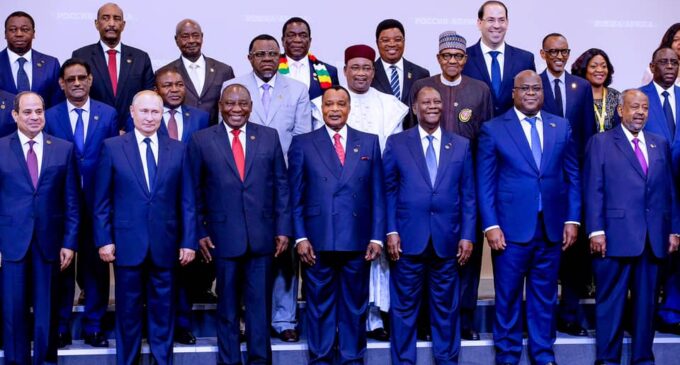What do Africans need from their leaders?

Just like the pervasive scourge of climate change that affects all of humanity, the clamour for a good leader is another point of unification for humans everywhere. Such agreement in the global outcry for leadership is sometimes misread as indications of parity in the outcomes that followers expect from their leaders. Europeans and Africans may demand good leadership, yet there is little to draw equivalence in their respective state of affairs. The question is: can two people with different needs be right to ask for the same thing?
Maybe the right place to start is not an inquiry into what makes a good leader. Maybe, it is better to clearly understand the different needs of the followers to tailor the leader to such a need.
It follows that before we make recommendations on the kinds of leaders suitable for Africans or Europeans, we should first ask what each of these broad classes of humans seek.
What do Africans need from their leaders? If I asked you to score the continent of Africa strictly on socio-economic outcomes, I guess you would give it a poor grade — and that is ok.
Relevant data has shown that people of this continent, on average, have the lowest life expectancy compared to the rest of the world.
Such poor performance is expressed more clearly in widespread starvation and malnourishment across the continent, a higher percentage of deplorable living conditions, and a higher incidence of sanitary-related diseases. It seemed pretty unsettling, though, that for all of its rich mineral resources, Africa is plagued by a leadership shortage that serves well to neutralize nearly all its advantages.
If, however, I ask that you repeat the same assessment for the western world, your score sheet will report a markedly different grade, and rightly so, too. Most developed nations are in this world, and their citizens lead a generally more comfortable life than their African counterparts.
With such good grades, the western world may appear perfect; but for a slight twist. It is plagued with a different challenge: anecdotal evidence shows that people from such affluent and modernist nations report more psychological needs than their African colleagues.
What are these psychological needs, you may ask? Well, for a start, we know that the marginalized minorities of the west are not as concerned with food and shelter as they are with social acceptance, autonomy and validation. Also, we know from the increasing case of school shootings and knife violence that the average young Caucasian adult is troubled, despite their immense material prosperity, and is struggling against a different type of crisis — an existential or meaning crisis. The condition is so paradoxical that the uninitiated African wonders how a people living in so much material surplus — almost romantic — can be dissatisfied to contemplate going out to protest for “inconsequential” causes. My advice to such an African is to heed the ancient warnings of the Bible that man shall not live by bread alone (meaning do not reduce all of a man’s needs to the physical).
All people with a fair bit of economic stability contend more with disillusionment and dysphoria, and my sense is any ostensible portrayal of a people mired in privation serves less to drown out the gnawing psychological malaise that bogs down the rich.
Anyway, without making any value judgment on who is troubled more, we can agree that tackling problems and challenges is a human universal: people everywhere deal with a form of a problem from a variety of sources which are personal, familial, and corporate or the state; and the distinguishing factor is how we resolve them. In other words, how well we solve problems separates us from other people. And as mentioned earlier, challenges are either physical or psychological, with a cross-cultural variability in the distribution.
Whatever the case, all human problems fall under these two categories: we are preoccupied with the physical requirements for survival, like food, shelter, clothing and security. Or overran by non-physical concerns like acceptance, approval, status, validation, security, stimulation, ecstasy or music. No matter how far we stretch the argument, all human challenges can be grouped under these two aspects.
Consequently, we can agree, irrespective of our political persuasion or geographical location, that the entire world desperately needs people who can solve these mounting physical and psychological challenges. These kinds of people are technically called leaders. Yes, a leader is any person with the growing competence and character to solve physical and psychological problems for other individuals, corporate entities, states or nations. This definition is crucial, and any mistake to get it wrong sets us up for failure.
Now that we understand the principal function and fundamental role of all leaders let’s discuss some suboptimal leadership analogies that do not serve our current needs. And while at it, we shall look at leadership from the first principle and show the dangers of a misapprehension of the concept.
I have written this piece to challenge our leadership heuristics and cognitive biases, to equip us with adequate resources to recalibrate and course-correct our way out of the local and global predicament we find ourselves in.
INFLUENCE
Most popular among the definitions of leadership is the idea that leadership is the ability to influence people to achieve a goal. This is an analogy of leadership and hardly a true statement. For it to be accurate, it must be historically consistent and universal. On these bases, the definition should apply to how earlier civilizations organized themselves across ages and around the world.
For instance, if we pull up George Washington, Napoleon Bonaparte, Joseph the Dreamer or King David, we should draw a parallel on influence as their quintessential leadership ability. We should also see how their capacity to influence others was the main differentiating feature of their personality. Alas! Available evidence has shown that we cannot draw that kind of conclusion. But quite the contrary, we now know that “influencing others” is a consequence of their leadership and not the cause of it.
In 1789 a revolution broke out in France: the peasants and lowborn were revolting against all forms of subjugation from their monarch. They were demanding equity and democracy. Their violent protest irked neighbouring European monarchs who felt that the success of such a revolution could give their own peasants ideas. To maintain the balance of power, these other monarchs formed a coalition to war against France in what is known as the French Revolutionary Wars.
Entered Napoleon Bonaparte. At age 26, he had become a military general who led French armies against the coalition forces. He fought from the front with never-before-seen strategies. Recorded history has it that on three distinct occasions, he conquered Europe save the formidable naval UK.
At a time when the emphasis was placed on the number of infantries, artilleries, calvaries and general war supplies that a country could march on to battle; when leading coalition forces like Austria, Prussia and Russia were concerned about crossing their troops to the battleground; Napoleon bested them by allowing his military troop stay in disperse settlement all around Europe; eating from the local produce of their host communities, and most importantly, outflanking his opponent before they can reach a critical mass. Even in modern times, Napoleon’s fame is still easily linked to his strategies. He was a tactician par excellence.
We can slow down and think about the odds of achieving all these based solely on “influencing others”. Fun fact: Napoleon was originally a native of Corsica and was detested by his French colleagues for his oddness, yet he became a military general by 26. Such meteoric rise is very much a credit to his competence and not a mere capacity to influence. To the extent that he solved the most daunting problems for the then-French state, he remained their leader.
The Napoleon story may appear too hard to believe despite being an actual person in history. Yet, the story of Joseph the Dreamer parallels quite nicely to underscore the point further (see Genesis 37–50).
It turned out that Egypt, famed as the birthplace of modern civilisation, was notified, through the Pharaoh, that a terrible famine was imminent. And that surviving it will require foresight, inventory and supply-chain expertise. Enter Joseph, the slave boy. He has just been summoned by the Pharaoh from a prison where he served time for inappropriate conduct with his former master’s wife. Talk about being hard done by life.
We know how the story ended. Joseph came in and saved the day. He designed three key instruments that are still in use today. First is the 20–80 Rule of Budgeting. Foreseeing the impending famine, he promulgated a decree that one-fifth of all harvest be saved for a rainy day. The second is Pricing as an efficient way of allocating resources. This he did to stave off people’s tendencies to waste scarce foodstuff. He controlled the supply and conserved the resources by requiring everyone to make payments (with money, cattle or land) for the ration they sought. Lastly, to guarantee that the government of Egypt was sustainably resourced for its functions long after the famine, he worked out a tax system that required everyone to pay 20% of their income to the government.
Joseph came armed with only two skills: the competence to solve problems for others and the strength of character that made him highly dependable (Jacob, his father; Potiphar, his master; the prison warden; and the Pharaoh, all delegated key responsibilities to him). Those traits differentiated him despite the barrier of slavery that had set him back. Also, like
Napoleon, he was an interloper, an outsider clothed in disfavour. And even worse, he was too young to be taken seriously.
But with the sheer force of competence and character, he became a prime minister in a strange land. His rise to such height was not in the least because he could influence the Egyptians but because they found him indispensable in tackling their existential challenges. Again, influence is merely an offshoot of genuine leadership, not the cause of it.
COMMUNICATION
A lot of us, without much thought, associate a person’s ability to communicate effectively with their leadership capability. This is another misleading leadership analogy. Your oratory skills, at best, enhance how you lead and can’t be the definitive trait for why you lead (except if the problem is a need to articulate ideas to people). Leaders like Martin Luther King or Barack Obama, skilled at delivering impassioned speeches, tend to have their audience misconstrue the essence of their addresses. We celebrate their verbal acuity without acknowledging their speeches’ therapeutic significance — their words give hope, a sense of identity and self-worth to heal the soul. The effect of their words is akin to the kind of utility derived from attending a church service or a psychotherapeutic session.
To further make the point, we can consider Elon Musk and Wizkid as examples of modern-day leaders who, despite lacking MLK’s verbal fluency, are the consummate solution-provider. In the light of our definition of interest, they serve, when working together, to address the complete human needs: physical and psychological. While Musk has busied himself with solving physical problems (using physics to shorten the time-space barrier) to ensure living is more comfortable, Wizkid, through music, is providing soulish succour for young people around the world (Music is one of our psychological needs, and anyone who meets that need is sure to influence us). This problem-solving edge grants Musk and Wizkid the powers to use their tweets to destabilize the stock market and stir young people to protest police brutality, respectively.
I imagine some of us may object to calling both Musk and Wizkid leaders because it does not sit well with our paradigm. That’s fair enough. We can reject their person, but what will we do about their sweeping social and market influence? And what about people like Sadhguru, who, famed for the practicability of his psychological recommendations yet characterized as a purveyor of pseudoscience, have enjoyed across-the-board invitations to speak at Google HQ, WEF, UN HQ, Havard and Oxford; and whose YouTube videos have over one billion views as of today. Whether we like to admit it or not, these people are leaders who solve problems and, consequently, wield influence.
FIRST-PRINCIPLE LEADERSHIP
Leadership, in its primary sense, is problem-solving. And before we attribute any other thing to it, we must spare no words to emphasize its pragmatic essence. Accepting this proposition provides us with the framework to assess some commonly misunderstood notions. For instance, a corporate manager or a team-sport coach is a leader to the degree that they understand their role in solving the problem of harnessing available resources for optimal outcomes. The resources may be labour (skilled or unskilled), footballers, basketballers, financial etc. The point is that the expectation is for such a person to have the know-how to extract the most value from a combination of these resources.
Managers in corporate environments can make great examples of well-rounded leaders: they solve physical and psychological challenges to advance their firms. They work to increase their shareholders’ wealth (physical need) and, simultaneously, validate (psychological condition) and mentor their subordinates to pursue meaningful goals in life.
The first-principle leadership framework affords us the practical advantage of improving our leadership capability since we can identify what we lack to solve the problem. This approach also justifies why, as leaders, we must upskill or retool to remain relevant. Lastly, the framework provides a logically consistent approach to assessing ourselves as micro-level leaders who rise by the value and significance of the kinds of problems we are solving.
Before we draw this to a close, let me make a quick side comment about two types of charlatans that have entered through the back door of leadership. First are the modern-day “influencers” who offer no real solution but are very aware of the power of influence and would circumvent the process to gain followers to shape public opinion. These are nothing but charlatans who, with time, will soon be off the beaten track since the market must correct itself when no real value is being produced.
Second is the incompetent power grabber who cannot solve any real-world problem but is available to lay claims to all the perks and rights that go with the responsibility of the office they occupy. A host of political leaders best emblematizes this second group: they are available to enjoy every right that their office confers, while at the same time, paying lip service to problem-solving or, in extreme cases, bold to state how they cannot solve any problem for their constituency — such is the anomaly that exists when we forget that rights and responsibilities are perfectly mutually-inclusive.
One reason we have these pseudo-leaders is our poor understanding of first-principle leadership.
CONCLUSION
As I draw the curtain on this piece, we shall review a few takeaways. The first is that challenges — psychological or physical — are a human universal that runs through the ages. And the people who have led their tribes came from the top of their local competence hierarchy either as the best farmer, hunter, wrestler, strategist or innovator or anyone who best solves these challenges.
Secondly, leadership should not be chased as a goal in itself, but rather, people should resolve to compound their competence to keep solving problems which is a sure path to leadership.
The third is that character as a trait is likely favoured as a proxy for competence. Still, a preferable approach is to have the competence to solve problems in combination with character to deliver authentic and sustainable leadership.
And lastly, that charisma and oratory skills are only helpful in enhancing leadership deliverables and must not be confused as the principal traits for leadership.
Our current state of affairs reveals that we have moved from the first principle of leadership through several iterations to ending up with a cheap imitation. All the analogies of leadership discussed above are now well-established as the entirety of leadership possibilities. I have tried in this piece to observe that they are not! And the sooner we re-assess our idea of leadership, the better for all of us.
Views expressed by contributors are strictly personal and not of TheCable.
















There are no comments at the moment, do you want to add one?
Write a comment